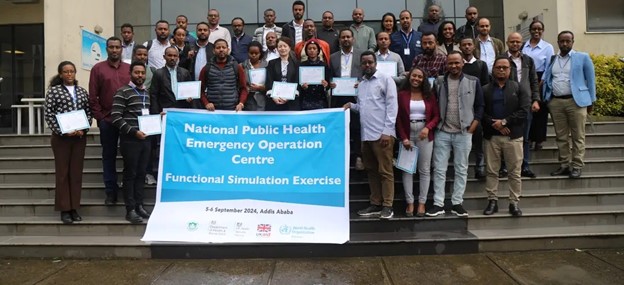
The IHR Strengthening Project (IHR-SP) recently collaborated with the Ethiopian Public Health Institute (EPHI) and its partners to support the evaluation of the national Public Health Emergency Operating Centre (PHEOC) in a simulation exercise. Using Marburg virus as a mock emerging public health threat, the national PHEOC’s preparedness and response mechanisms were put to the test over the course of two days in September.
IHR-SP previously provided simulation exercise management training for 27 experts from Ethiopia’s national and sub-national PHEOCs in March 2024, enabling the EPHI team to effectively plan and perform this functional exercise.
Working jointly with WHO-Ethiopia, Africa CDC and Ohio State University (OSU) to support EPHI to plan and run the exercise, IHR-SP Emergency Preparedness Response and Resilience (EPRR) experts additionally provided technical advice on the exercise aims and objectives, the master scenario, development of the Master Event List and injects and briefing the exercise management team. IHR-SP EPRR team members also participated as exercises facilitators, controllers, and evaluators on the day of the exercise.
There were 39 participants on the exercise from different directorates of EPHI including the national PHEOC, Ministry of Health and regional PHEOCs. The participants were expected to respond to the simulated scenarios and injects in order to assess five objectives at national level:
- operationalization of key plans and procedures of the emergency management
- coordination and collaboration of the emergency management
- information sharing and management capability for decision making
- PHEOC to PHEOC communication and technology use capability
- testing capacity of public health measures during public health threats like Marburg Virus Disease.
The exercise was opened by Dr. Melkamu Abte, EPHI Deputy Director General, who mentioned the importance of such exercises to assess and strengthen national public health emergency response capacity and directed regional participants to perform similar exercises at sub-national levels, taking their contexts into consideration. Dr. Melkamu thanked EPHI-PHEOC team for coordinating the exercise, UKHSA for its technical and financial support as well as other partners for their technical support.
The exercise was concluded successfully and was appreciated by the facilitators and participants as evidenced by the post-exercise feedback. One of the participants said in the feedback, “the exercise was well organized with welcoming environment and inclusive. It helped me to fill my gaps and understanding of response system, plans and procedure. It prepared me well for emergency management.’’
The exercise management team, which include facilitators, controllers and evaluators of the exercise, agreed to finalize and share an exercise report and improvement plan to enable EPHI to take necessary actions based on the recommendations. UKHSA IHR-SP EPRR team will support this report finalization.
Sajil Liaqat, IHR-SP’s Country Lead for Ethiopia said:
“Enhancing national preparedness to public health emergencies is critical to controlling outbreaks, so it is brilliant to co-design and co-deliver this exercise which builds on previous training and capacity strengthening work jointly undertaken by IHR-SP and EPHI. Thanks to good collaboration between all partners, the exercise was a resounding success and we hope that emerging recommendations will provide useful insights for the future. We are committed to continuing to support the capacity strengthening needs of EPHI wherever possible, building on our strong partnership.”

Image: Participants and facilitators at the end of the exercise